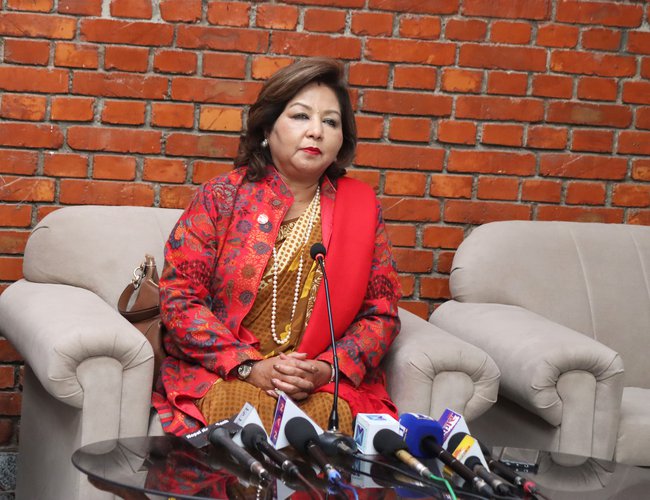
Minister for Foreign Affairs Dr. Arzu Rana Deuba and the members of her delegation delivered oral statement at the International Court of Justice (ICJ) at the Court’s public hearings on the ‘Obligations of States in respect of Climate Change’ on Monday.
Speaking before the Court, Foreign Minister Dr. Rana emphasised that, despite Nepal’s snow-capped mountains and glaciers playing a crucial role in maintaining climate balance, supporting ecosystems, and preserving biodiversity, they were increasingly threatened by the rapid effects of global warming and consequent climate change.
“We are having to bear the brunt of the impacts of climate change in a disproportionate manner. In fact, we are paying for a bad ‘karma’ that we did not committed,” she said, according to a statement issued by the Ministry of Foreign Affairs on Monday.
She underscored the vulnerability Nepal faced due to its geographical circumstances and relatively low level of development and made a strong case for climate justice to ameliorate the harsh suffering the climate change has brought to the lives of Nepali people.
She called out the gross injustice that countries like Nepal were experiencing. “We have been penalised for the mistakes we never made, for the crimes we never committed,” she added.
The Foreign Minister highlighted Nepal’s position that many vulnerable States were not able to meet the obligations under international human rights law as the actions and emissions arising from beyond their territory also had effects on the specific rights of their citizens.
Nepal’s position on the other aspects of State obligations regarding climate change was presented by Udaya Raj Sapkota, Secretary at the Ministry of Law, Justice and Parliamentary Affairs.
Sapkota underscored that the general obligation to prevent transboundary harm, based on the concept of due diligence, was a well-established rule in international law. He added that such an obligation was applicable in the context of climate change as well.
He further clarified Nepal’s position on the ‘differentiated’ nature of obligations based on treaties related to climate change. He also called for considering specific vulnerabilities of landlocked and mountainous countries as well as overall economic capabilities and constraints, while applying the principle of differentiated obligations.
In Nepal’s third and last oral statement, Suvanga Parajuli, Under-Secretary, Ministry of Foreign Affairs, spoke on the legal consequences when the States fail to uphold the obligations regarding climate change. Parajuli refuted the characterisation of the climate crisis as a “collective tragedy where no specific responsibility could be assigned”.
He argued that the responsibilities could be established based on the customary international law on the responsibility of states regarding internationally wrongful acts. He further added that the developed countries have a collective duty to compensate for the harm caused by their emissions given the composite nature of state responsibility in climate change.
- Green Hydrogen in Nepal: Unlocking a sustainable energy future
- Jul 14, 2025
- Embassy of Nepal in India and PHDCCI India-Nepal Centre Organised “India-Nepal Economic Cooperation Meet 2025
- Jul 14, 2025
- Glacial Lake Outburst Floods Mustang
- Jul 14, 2025
- Weather Forecast: Generally Cloudy Across The Country With Possiblity of Heavy Rain At One Or Two Places In Bagmati, Koshi, Lumbni And Karnali
- Jul 14, 2025
- High-Level Nepali Delegation to Visit Israel and Participate in Muni Expo Conference 2025
- Jul 13, 2025













